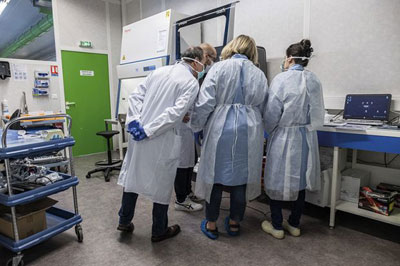Researchers weigh return to labs on non-coronavirus work
View(s): Research organisations across Europe are quietly planning how scientists can continue lab-based work on experiments that are not part of the fight against coronavirus as they weigh the long-term health costs of delaying projects against the immediate need to stop infections.
Research organisations across Europe are quietly planning how scientists can continue lab-based work on experiments that are not part of the fight against coronavirus as they weigh the long-term health costs of delaying projects against the immediate need to stop infections.
Their overwhelming priority remains tackling the virus through research and keeping academics safe and at home if possible.
But Peter-André Alt, president of the German Rectors’ Conference, said that there was a “risk of focusing completely on the corona issue and to ignore or at least not take into account that there are other problems”. He added: “There is a life in science beyond the virus.”
At France’s National Centre for Scientific Research (CNRS), a network of about 33,000 researchers spread across more than 1,000 labs, roughly one in 10 staff had been authorised to physically come into work, explained Antoine Petit, its president. France currently has a ban on travel for non-essential work.
“The message is: if you work on Covid-19, then you can go to your lab, no problem,” he said. Other academics, such as mathematicians, theoretical physicists, social scientists and humanities scholars were working from home “more or less as normal”, he explained.
Still, the CNRS has nonetheless authorised some scientists to go into labs, even when not working on coronavirus-related experiments, if their research cannot be easily interrupted. These include, for example, projects in particle physics or astronomy where researchers needed to check measurements in person, Professor Petit explained.
“We can’t say this too loudly,” he said. “In practice, we have been much more open.”
Physical distancing measures have in places meant an abrupt end to experiments in progress: Science has reported that thousands of mice were being killed in US labs in advance of feared shortages of personnel to care for them.
Gilles Roussel, president of France’s Council of University Presidents, said that he was not aware of similar euthanasia in France. “They [labs] have tried to continue this special kind of research,” he said.
Meanwhile in Dresden, the Max Planck Institute of Molecular Cell Biology and Genetics went “fully virtual” on 13 March, explained Ivan Baines, its chief operating officer, who is now mulling who should physically return.
The institute, normally focused on basic rather than applied research, has rapidly pivoted to tackling coronavirus, he explained, from antibody detection to ramping up testing capability.
A maximum of 50 researchers will be physically allowed in the institute, down from a norm of about 500. Small teams will stay apart, there will be a maximum of one person per bay in labs, and only volunteers from low-risk groups will come in.
Once coronavirus projects are up and running, the institute will look at whether it can fit in other research, Dr Baines explained, but will only ask the authorities for permission “in a couple of weeks” because any sooner could send the wrong message.
Dr Baines said that he was not aware of other research centres “overdoing it” by shutting down too much work. Rather, “some institutions…have not [been] responsive enough,” he warned. “Scientists are absolutely driven…they are living in a competitive world,” he said. “All they care about is getting back to work.”
At the Dresden institute, “we had to go virtual, and then come back,” Dr Baines said. “My worry is, keeping everything going, you get an infection, and then you take out the whole institute.”
Andrew Steele, a science writer who campaigns for more long-term investment in research, said that the fact that trade-offs between infection risk and longer term scientific progress were being made “on the hoof” was “indicative of governments’ failure to make detailed plans for pandemics”.
“We’re taking a serious short-term hit on the economy to try to get the virus under control in the hope that this is the best of a bad set of options economically in the long run. The same basic story probably applies to science too,” he said.
Another looming question is how long it will take before researchers run out of tasks they can do at home and need to return to their labs. With so much backdated lab book and manuscript work to catch up on, “we will not lose productivity even if people stay at home for two to three months”, said Dr Baines.
Estimates vary, but others think that the crunch point will come sooner.
A longer lockdown will make things “more complicated”, said Professor Petit. “Lab work must continue, at least in early May,” said Professor Alt.
- D. Matthews



